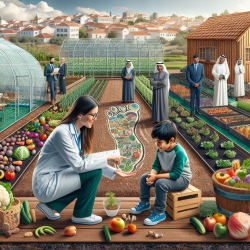Introduction
As a speech-language pathologist, your role in supporting children's development extends beyond communication skills. Nutritional health plays a crucial part in cognitive and communicative development, which is why understanding sustainable food practices is essential. The research article "Sustainable food transition in Portugal: Assessing the Footprint of dietary choices and gaps in national and local food policies" offers valuable insights that can be applied to your practice.
The Importance of Sustainable Food Practices
The study highlights that food consumption in Portugal is the largest contributor to ecological overshoot, accounting for about 30% of the transgression of Earth's carrying capacity. This is due to high meat and fish consumption, significant food wastage, and a reliance on imported food resources. These factors are not only environmentally unsustainable but also affect public health and nutrition, which are critical for children's development.
Implications for Speech-Language Pathologists
Understanding the ecological and nutritional implications of dietary choices can enhance your practice in several ways:
- Holistic Child Development: Nutrition impacts cognitive and language development. By advocating for balanced diets, you can support better developmental outcomes in children.
- Educational Initiatives: Incorporate lessons on sustainable eating into therapy sessions. This can include activities that teach children about different food groups and the importance of a balanced diet.
- Policy Advocacy: Use your role to advocate for policies that promote sustainable food systems in schools, ensuring children have access to nutritious meals that support their learning and development.
Encouraging Further Research
The research suggests that there are significant gaps in local policy implementation regarding sustainable food systems. As a practitioner, you can contribute to filling these gaps by:
- Conducting Research: Explore the relationship between dietary habits and speech-language development. This can provide evidence to support policy changes.
- Collaborating with Nutritionists: Work with nutrition experts to develop comprehensive programs that address both communication and nutritional needs.
- Community Engagement: Engage with local communities to raise awareness about sustainable food practices and their impact on child development.
Conclusion
Integrating sustainable food practices into your speech-language pathology practice not only supports environmental sustainability but also enhances the developmental outcomes for children. By leveraging the insights from the Portuguese study, you can advocate for and implement changes that benefit both individual children and the broader community.
To read the original research paper, please follow this link: Sustainable food transition in Portugal: Assessing the Footprint of dietary choices and gaps in national and local food policies.










